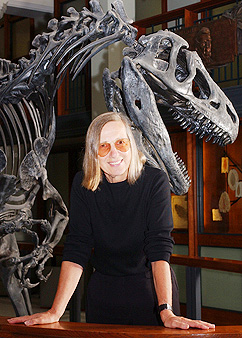
Geoscientist Online 18 July 2007
Ted Nield with a cautionary tale of science, peer review, and Charlton Heston…
First, in 1980, came a Nobel Prize-winning physicist and his geologist son who found an end-Cretaceous iridium-rich layer in Italy that nobody else had noticed. They found it all over the world. Like stout Cortez and all his men, they made a truly wild surmise – and appeared to solve a great and abiding mystery. Dinosaurs had been killed off in a global apocalypse from outer space. Walter Alvarez described the theory in a popular book with a truly great title – T. rex and the Crater of Doom. Dinosaurs, amazingly, had got even sexier.
What was more, the public found it was being handed a "nuclear winter" scenario just as one was needed to counteract the Cold War, then re-igniting under Reagan and Thatcher. Carl Sagan, no less, made the connection. Nuclear war, amazingly, had become even deadlier.
Never was a science news story more exciting, better aimed, more timely, or backed by scientists and writers with higher credentials. Like all good stories, it kept moving on. Not long after the "nuclear winter" angle was played out, the crater of doom itself was, it seemed, finally located – at least 170km km across, and conveniently close to the USA, just offshore Yucatan in the Gulf of Mexico. Journalists and NSF fund managers learned how to spell Chicxulub.
A funding tsunami soon flooded in, driven by the possible dino-connection. CGI dinosaurs, looking furtively over their shoulders only to be blown away by shockwaves and broiling hypercanes, became a cliché of the documentary genre. Chicxulub even starred in a Hollywood film, Chuck Heston himself intoning his portentous voice-over for Armageddon (1998) - a disaster movie in every sense.
Not surprisingly, it stuck. Today, among the public, the "killer impact" theory is almost universally accepted as proven fact. It's something everyone knows, and everyone loves. And alas, like so many – perhaps all – those things that we believe because we want to, it's wrong.
That, at least, has been the contention of a small group of researchers led by Professor Gerta Keller (Princeton University), a stratigraphic palaeontologist and expert on the faunal changes at the K-T boundary. She, together with a small band of co-workers, has been doggedly throwing ugly little facts in the path of the Chicxulub juggernaut for years, and receiving, she says, scant thanks for her pains.
A proponent of the multi-cause hypothesis of end-Cretaceous extinction, she has never denied the reality of the Chicxulub impactor. Nor has she denied that it would have contributed towards making the late Maastrichtian a particularly nasty time to be alive. She merely challenged its status as the dino-nemesis – but that, for many, was the greater treason; for it was the dinosaur connection that constituted Chicx’s funding paydirt.
According to Keller, the impact happened too soon - one of a number of major hits that clustered about the K-T boundary, but 300,000 years too old to live up to the claims of those who believed they had found the “smoking gun”. Meanwhile, from more than 200 localities across the world, a database began to be built up that supported an alternate theory involving Deccan volcanism, climate change and (largely coincidental) impacts.
This was not, as we have come to say, “on message”.